Have you ever heard that water is life? It’s true. Every part of our body relies on water. It makes up more than half of our body weight. Without it, we couldn’t survive. Water helps us stay at the right temperature, keeps our joints working smoothly, helps get rid of waste, and brings nutrients to our cells.
Key Takeaways : Water Requirements For Optimal Health
- Water is crucial for maintaining optimal health and bodily functions.
- Adequate daily water intake helps regulate body temperature, lubricate joints, and remove waste.
- Staying hydrated can support cognitive function, physical performance, and energy levels.
- Individual water needs can vary based on factors like activity level, climate, and health conditions.
- Monitoring urine color and thirst perception can help assess hydration status.
Importance of Water for Health
Water is key for good health. It helps us in many ways. This includes keeping our body temperature right, making sure our joints work well, and carrying nutrients to our cells. Water also helps get rid of waste when we pee, sweat, or go to the bathroom.
Consequences of Dehydration
Not drinking enough water can cause problems. It can make you tired, give you a headache, and make it hard to focus. These dehydration symptoms affect how well you do things, both physically and mentally. So, keeping hydrated is vital for your body and brain to work right.
Role in Body Processes
Water is crucial for several body functions. It helps control your temperature, makes sure your joints work smoothly, and carries nutrients where they need to go. Being well-hydrated supports your internal health and the working of your organs.
Recommended Daily Water Intake
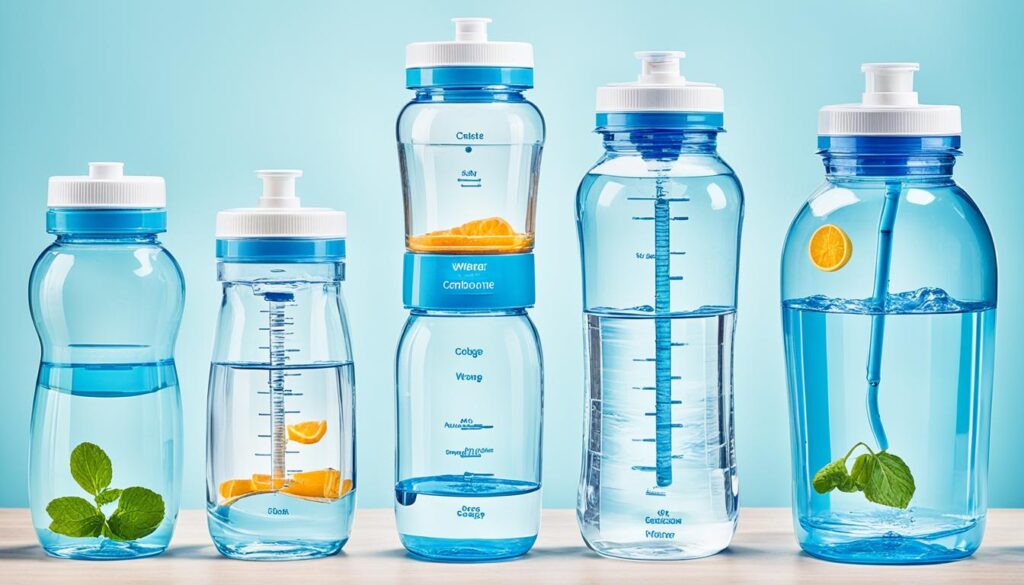
The U.S. National Academies of Sciences, Engineering, and Medicine set guidelines for how much water is enough each day. They say men should drink about 15.5 cups, which is 3.7 liters. Women, on the other hand, need roughly 11.5 cups, or 2.7 liters. This count includes all fluids individuals drink and the water in foods.
General Guidelines
These general water intake guidelines are a good place to start. But everyone’s needs are different. How much water you need daily depends on your age, if you’re male or female, how active you are, and your health.
Variations by Age and Gender
What’s right for you might not be the same for someone else. For example, teenagers might need a bit more water daily. From 14 to 18 years of age, boys should aim for 17 cups (4 liters). Girls the same age should drink about 12 cups (2.8 liters).
But as people get older, they might need less water. After the age of 70, adults can sometimes feel less thirsty. This means their bodies do not need as much water.
| Demographic | Recommended Daily Water Intake |
|---|---|
| Adult Men | 15.5 cups (3.7 liters) |
| Adult Women | 11.5 cups (2.7 liters) |
| Adolescent Boys (14-18 years) | 17 cups (4 liters) |
| Adolescent Girls (14-18 years) | 12 cups (2.8 liters) |
| Older Adults (70+ years) | Lower than adult recommendations |
Remember, these water intake guidelines are a good starting place. Yet, what you need could vary. Your doctor or a healthcare expert can offer the best advice. They can help figure out how much water is right for you, considering your health and way of life.
Factors Affecting Water Needs
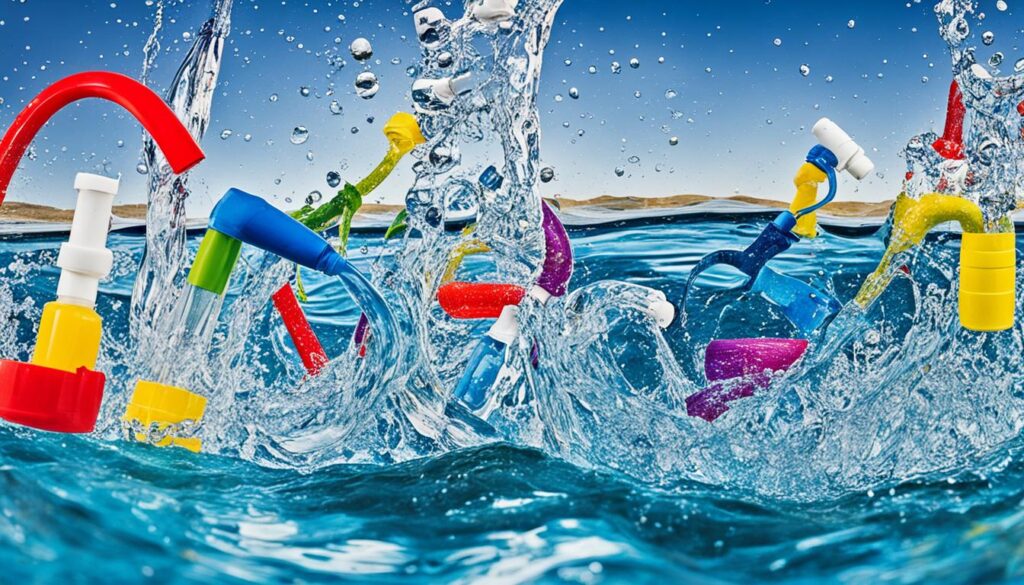
The amount of water you need daily can change. It depends on many things.
Physical Activity Levels
Moving a lot means you need more water. Sweat from running, playing sports, or just being active makes you lose water. You’ll need to drink more to stay hydrated. This is especially true for athletes and very active people.
Environmental Conditions
The weather and where you are affect your water needs. In hot, dry places, you lose more water. High altitude and dry air can also cause water loss. This means you need to drink more to stay hydrated.
Health Status
Some health issues can make you need more water. Fevers, diarrhea, or vomiting are examples. They cause your body to lose water fast. Drinking more water helps replace what’s lost. But, if you have heart or kidney problems, you might need to drink less.
Pregnancy and Breastfeeding
Expecting moms and those breastfeeding need extra water. Pregnancy and producing milk make you lose a lot of fluids. These life stages increase how much water you need. It’s important for both mom and baby’s health to stay well-hydrated.
| Factor | Impact on Water Needs |
|---|---|
| Physical Activity Levels | Increased water needs to replace fluid losses from sweat and exercise |
| Environmental Conditions | Higher water requirements in hot, dry, or high-altitude environments |
| Health Status | Increased needs with conditions that cause fluid loss, decreased needs with certain medical conditions |
| Pregnancy and Breastfeeding | Elevated water requirements to support the mother and child |
Signs of Proper Hydration

Keeping an eye on how hydrated you are is key to staying healthy and feeling good. You can tell if you’re drinking enough water by noticing a few important signs:
Urine Color
The color of your urine is a simple way to see if you’re hydrated enough. If it’s a light, straw-like yellow, you’re probably doing well. But, dark yellow means you might need more water. And if it’s almost clear, you might be drinking too much.
Thirst Perception
Your body tells you it wants more water when you feel thirsty. Always feeling like you need a drink could mean you’re not taking in enough water. Listening to these signals and then drinking water can keep your hydration status right where it should be.
Watching your urine and how often you feel thirsty can tell you a lot about your water intake. You’ll know if you’re drinking enough water to help you stay healthy and well.
Water Requirements For Optimal Health

Staying hydrated is key to being healthy and feeling good. Water is needed for many body functions. For example, it helps keep our body temperature steady, makes our joints work smoothly, removes waste, and carries nutrients around. Drinking enough water each day helps us do better physically and mentally. It supports our immune system and could also keep us from getting sick.
The U.S. National Academies of Sciences, Engineering, and Medicine set daily water drinking goals. But how much water someone needs can change a lot. This depends on how active you are, where you live, and your health. It’s important to watch these factors and drink more water when needed. This way, you stay well-hydrated for your best health.
Being properly hydrated is crucial. It helps our body in many ways, from keeping us cool to getting rid of waste. Drinking enough water each day boosts how we think and how our body fights off sickness. By knowing what your body needs and keeping water intake high, you support your health. This simple act allows your body to operate at its peak.
Hydration and Energy Levels
Keeping hydrated is key for having enough energy and doing your best mentally and physically. Not drinking enough water can drag down your mood and body.
Effects on Physical Performance
Drinking enough water is vital for being good at sports or working out. When you’re not hydrated enough, you’re more likely to get tired quickly. This makes your muscles work less well and you feel more worn out. So, by keeping up with water, you can go longer without feeling as tired.
Impact on Cognitive Function
Hydration affects how well you think and understand things too. Being low on water can make it hard to focus, remember, and stay in a good mood. But, staying hydrated helps you think better, make smarter choices, and keeps your mood and mind sharp.
Water and Weight Management
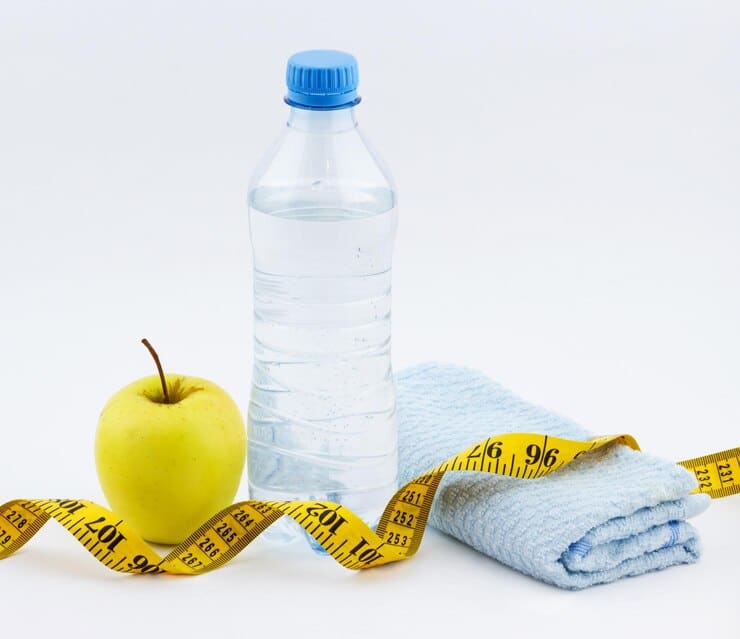
Drinking enough water is good for weight control. It affects how hungry you feel and your metabolism, both important for staying at a healthy weight.
Role in Appetite Regulation
Drinking water can make you feel less hungry and more full. It helps you eat fewer calories. That’s good for losing weight. So, if you’re trying to stay fit, water’s a great help.
Metabolism and Water Intake
Hydration affects how fast you burn calories. If you’re not drinking enough, your metabolism slows. It can become harder to lose weight. But, keeping hydrated supports a healthy metabolism. This can aid in managing your weight better.
Water is essential for keeping your body working well. It helps with adjusting body heat, moving nutrients, and getting rid of waste. Making sure you drink enough water is key for weight management.
Water and Disease Prevention
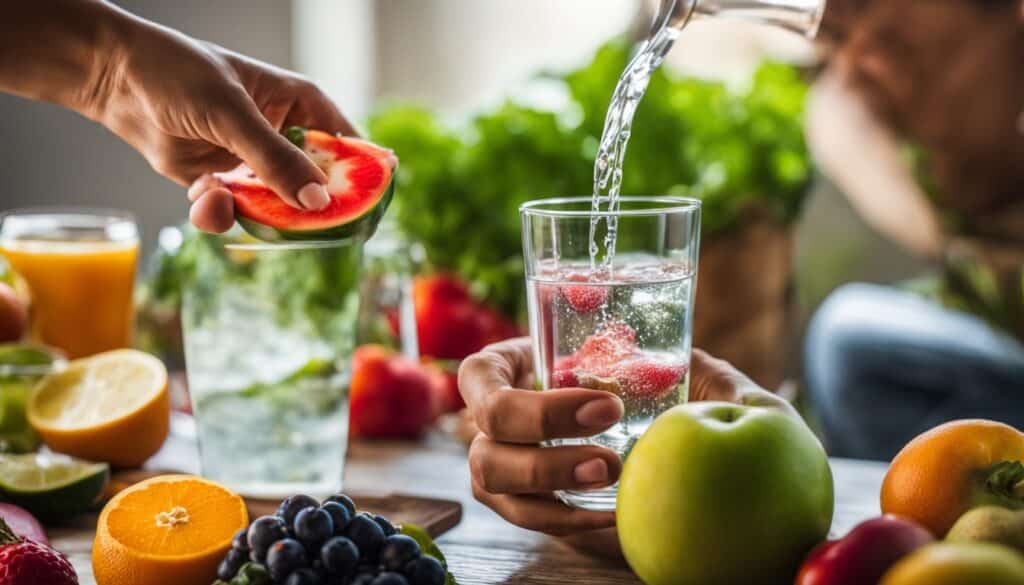
Drinking enough water is key to staying healthy and avoiding some medical issues. It can help prevent kidney stones, UTIs, and skin problems. With the right amount of water each day, you reduce the chance of these health troubles.
Kidney Stone Risk
Kidney stones are painful rocks that form in your kidney. When you drink more water, it makes your pee less concentrated, which can prevent stones. Lots of water means you’re less likely to get kidney stones. This is why drinking water and kidney stone risk go the opposite ways.
Urinary Tract Infections
A UTI is a common infection that affects the urinary tract. This can be less of a worry if you drink plenty of water. It helps to keep the urinary tract clean. And, staying hydrated is important for a strong bladder.
Skin Health
Your skin needs water to stay healthy. Without enough, it may become dry and rough. Water keeps your skin looking good and feeling soft. That’s why drinking water and skin health go hand in hand.
So, drinking water is crucial for avoiding serious health issues. It helps protect your kidneys, your bladder, and your skin. Keep in mind the the importance of hydration for health. It’s a simple way to take care of yourself.
Other Fluid Sources
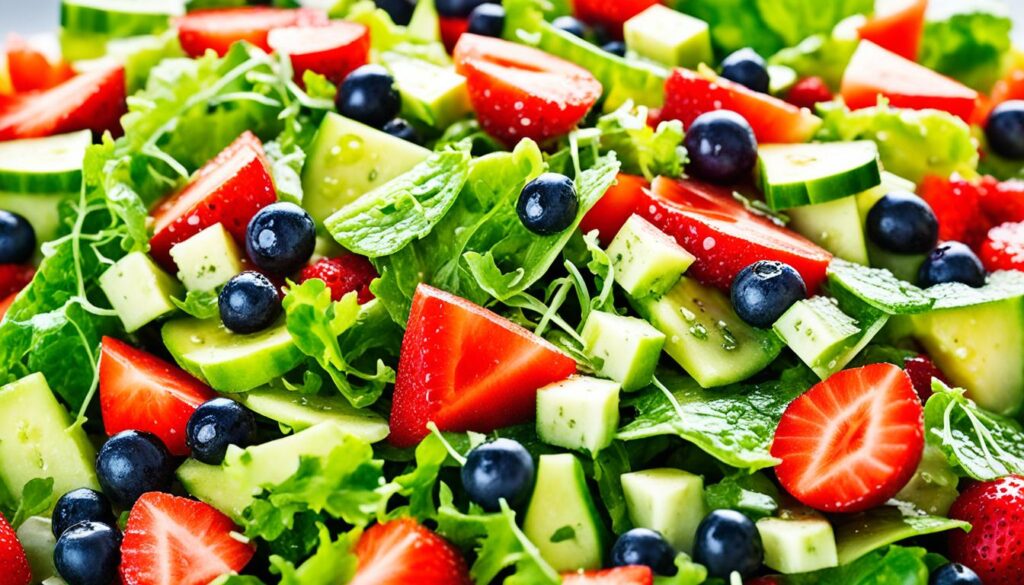
While water is the best choice for staying hydrated, other sources can help too. Beverages and water-rich foods also keep you hydrated. This means you have many ways to meet your daily fluid needs.
Beverages and Hydration
Besides water, several drinks can help keep you hydrated. Milk, fruit juices, and some herbal teas give your body fluids. Coconut water and sports drinks are good for after working out. They help replace lost electrolytes, keeping your fluid levels balanced, especially in hot weather or during exercise.
Water-Rich Foods
Fruits and vegetables are loaded with water, making them great for hydration. Watermelon, strawberries, cucumbers, and tomatoes have high water content. They are delicious ways to keep up your fluid intake. Adding these foods to your meals boosts your hydration in a healthy, fun way.
Staying Hydrated Throughout the Day
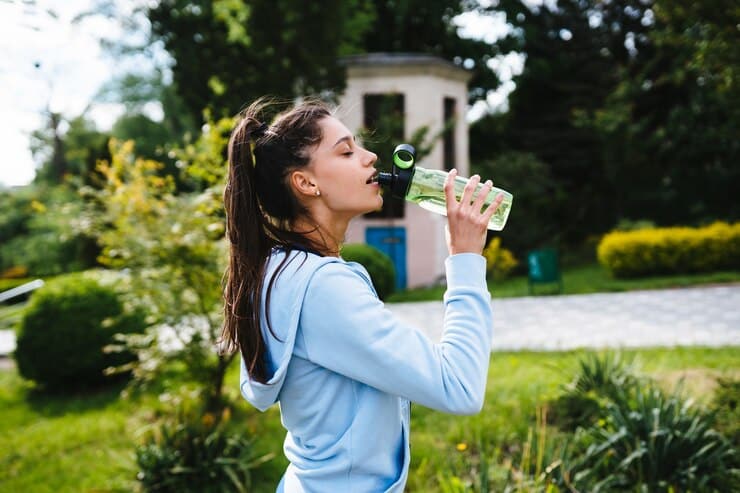
Keeping well-hydrated can sometimes be hard. But, there are many ways to make it easier. These tips can help you drink enough water all day.
Carrying a Water Bottle
Carrying a water bottle all the time is a smart move. It’s an easy way to make sure you’re always ready to take a drink. Find a bottle you like that’s also easy to use and fill up.
Flavoring Water Naturally
If plain water doesn’t excite you, try adding fruits or herbs. This makes water taste better and makes you more likely to drink it. You can mix things like strawberry with basil or lemon with lime. It’s a fun way to stay hydrated.
| Hydration Tip | Benefit |
|---|---|
| Carry a reusable water bottle | Keeps you reminded to drink water. Helps you stay hydrated |
| Infuse water with fruits and herbs | Makes water more flavorful and appealing to drink. Boosts water intake |
| Establish a daily hydration routine | Improves how well you stay hydrated every day |
These tips, by making them a part of your day, will help you achieve hydration goals. Your body will thank you for the extra water.
Water Intake Strategies
Keeping hydrated is vital, and it’s best to be proactive. One simple way is to check your urine color. A light, pale yellow shade means you’re well-hydrated. But if it’s dark, you should drink more water.
Monitoring Urine Color
Watching your urine color gives great clues about your hydration level. Remember, your pee color can change with some foods and meds. Knowing your normal color helps you see when it changes.
Drinking Water with Meals
Adding water to your day is smart. Try to drink a glass with every meal. Also, adding fruit or herbs can make it tastier. This way, you’ll get enough water daily.
Replacing Sugary Drinks
Soda, juice, and sweetened drinks bring too much sugar. Swapping them for water or unsweetened beverages is healthier. It helps with hydration and cuts down on sugar intake overall.
Also Read : All The Reasons Why You Should Start Drinking Coconut Water Today
FAQs
What are the essential functions of water in the body?
Water is crucial for our health, making up 50-70% of our body weight. It’s needed for every part of our body to work well. This includes regulating body temperature, keeping joints working smoothly, getting rid of waste, and delivering nutrients to cells.
What are the consequences of dehydration?
Dehydration can cause tiredness, headaches, and trouble focusing. Water is key for many important body functions. So, staying hydrated is vital for feeling your best.
What are the general guidelines for adequate daily water intake?
The U.S. National Academies suggest adults should drink a lot of water. Men should have about 15.5 cups a day, while women need around 11.5 cups. This includes fluid from drinking and water-rich foods.
How do individual factors affect water intake needs?
Water needs vary depending on a person’s physical activity, environment, health, and whether they’re pregnant or breastfeeding.
What are some signs of proper hydration?
Knowing if you’re hydrated well isn’t hard. Pay attention to your urine and if you’re thirsty.
How does water intake impact physical and cognitive performance?
Being well-hydrated keeps your energy up and your mind sharp. It’s important not just for your body, but also your brain.
How can water intake support weight management efforts?
Water helps control hunger and boosts your metabolism. These are essential for keeping a healthy weight.
How can proper hydration help prevent certain health conditions?
Drinking enough water could lower the risk of kidney stones, UTIs, and certain skin issues.
What other fluid sources can contribute to overall hydration levels?
Beverages and foods high in water, besides just plain water, help you stay hydrated. They are good options too.
What are some strategies for maintaining proper hydration throughout the day?
It can be tough to drink enough water. Carrying a water bottle and adding fruit for flavor can make it easier.
Source Links
- https://www.healthline.com/nutrition/how-much-water-should-you-drink-per-day
- https://www.mayoclinic.org/healthy-lifestyle/nutrition-and-healthy-eating/in-depth/water/art-20044256
- https://nutritionsource.hsph.harvard.edu/water/


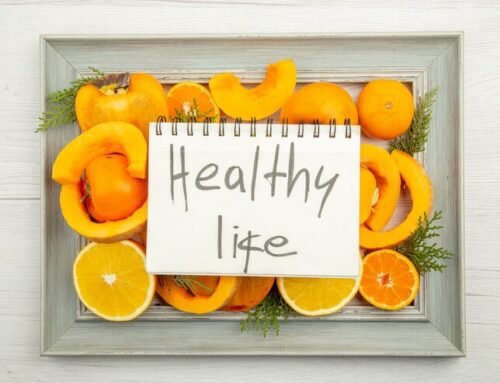



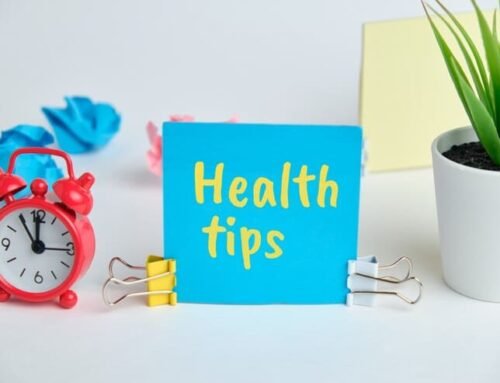
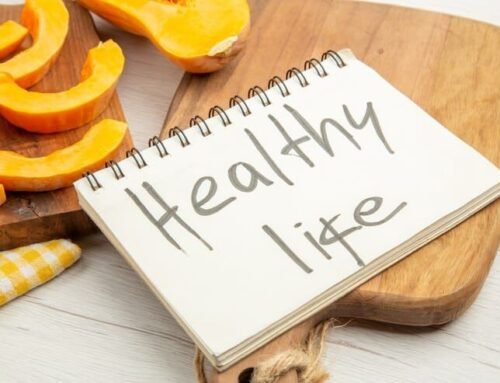
Leave A Comment